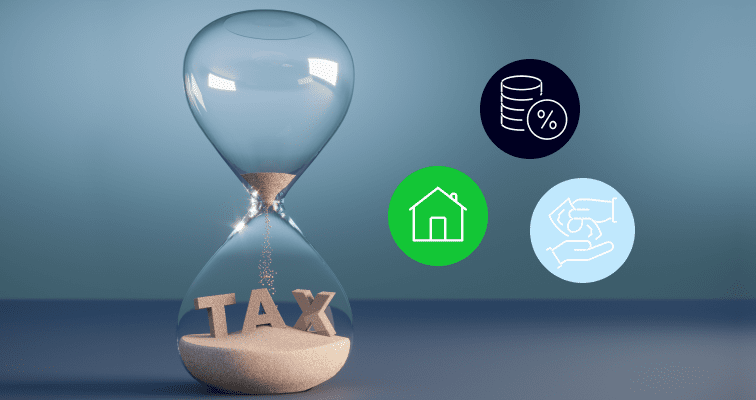In Austria, when you sell financial assets such as shares, property or crypto, you may need to pay capital gains tax (CGT) on any profits you make. Find out what CGT is, how it works, and what you should know to ensure that you comply with legal requirements while protecting your investments.
The process of buying stocks is made relatively straightforward by online trading platforms that provide a user-friendly way of depositing funds with a trusted broker and gaining exposure to the financial markets. Selling those investments, however, is not always so straightforward. If you sell an asset at a price that is higher than what you paid for it, then you could be liable to pay tax on your capital gains.
The tax situation in Austria can be complex, but this guide will help you to navigate the process seamlessly. It explains what Austrian CGT (KESt) is, how to calculate and report it, and how to ensure that you pay no more than the legal requirement.
What is capital gains tax (CGT)?

The simplest forms of capital gains tax are payments you are obliged to make when you make a profit from buying and selling shares, property or other assets within capital markets.
It is your obligation to ensure that all of your CGT requirements are met. Incorrect or late reporting, or underpayment of tax, can result in fines and legal charges.
Tip: Developing a greater understanding of CGT can reap benefits, as there might be strategies to minimise your tax charges.
In Austria, the default CGT rate (that is most likely to be applied to your investments) is 27.5%. That being said, the amount of CGT you pay will depend on numerous factors, such as your personal tax profile and the specific asset in question, as tax rates vary across different types of assets.
The duration for which you hold an investment will also impact your CGT rate, as generally, long-term investments are subject to a lower CGT rate than returns made from short-term trades. Also, consider any capital losses, as these may be offset against gains on other trades and, therefore, minimise your overall tax burden.
What assets have capital gains tax?
All investors should be aware of which of their assets are subject to CGT. While not an exhaustive list, investors in Austria usually have to pay capital gains tax on profit made from the following assets:
- Publicly listed stocks and shares
- CFDs and derivatives
- GmbH shares
- Securitised derivatives
- Certificates
- Cryptoassets
- Bonds and bond coupons
- Foreign currency
- Interest earned on bank deposits (subject to a 25% CGT withholding tax)
- Overseas investment funds
- Dividends
- Real estate investments (taxed at a higher rate of 30%)
- Real estate funds
Some capital assets are not liable for CGT. It is important to carry out your own research to confirm whether this is the case, but items that might be CGT-exempt in Austria include:
- Real estate (your primary residence) (T&Cs apply)
- Land, up to a surface area of 1,000 square metres
- Personal assets such as art that have been held for more than 12 months
- Some gifts
- Winnings from lotteries or certain forms of gambling
How does CGT impact my other investments?

CGT affects the returns you make on your investment activity. Essentially, CGT means that the net proceeds on your investments will be lower than the gross profit.
With this in mind, CGT may influence your overall approach to investing, if you tailor your strategy to make it more tax efficient.
For instance, in Austria, dividends and coupons on bonds are liable for CGT in the same way that capital gains are. This differs from many countries where dividends are CGT-free, and, therefore, where investors might prioritise long-term investing as a tax-efficient passive income strategy.
The most obvious trigger of a CGT event is the sale of a financial instrument, such as shares.
One of the most important things to remember is that it is your obligation to ensure that your CGT is reported and paid correctly, and that you must check whether you will need to complete a tax return.
Tax returns can be filed electronically using the FinanzOnline portal or in paper format. If you use the online method, you will find that there are guidance notes to help you to provide the necessary information and documentation.
The deadline for completing online returns is June 30 in the year following the tax year, which runs on a calendar basis. The deadline to submit paper returns is April 30.
If you fail to file your tax return on time or submit inaccurate data, you may be liable for fines and penalties. These include tax breaks such as the offsetting of capital losses not being permitted, or more severe penalties such as cash fines.
Tip: The Austrian tax authority has a well-designed and informative website that provides “golden source” information on how the tax system works.
If you are new to investing or have a sizeable and diversified investment portfolio, it is wise to seek help from a specialist tax agent to ensure that you do not fail to comply with any of your CGT liabilities. A professional can also help you to file your returns correctly if you need to, and they may identify ways to reduce your overall CGT burden.
How do I calculate my CGT?
Regulations that were introduced on April 1, 2012 detail CGT in Austria.
The fact that the tax codes are well established in Austria means that the process is relatively straightforward, well-documented and widely understood.
Most capital assets are taxed at a flat rate of 27.5%, which keeps things simple.
Some exceptions do exist, however, including:
- The tax rate on real estate transfers between family members (30%)
- Interest on bank savings accounts is taxed at 25%.
How can I minimise my CGT burden?

A lot of your CGT liability will be withheld at source, but there are still some ways to reduce the amount of tax you pay each financial year, such as the potential to reduce your overall tax burden by offsetting certain costs (such as transaction fees) and capital losses (losing trades) against capital income earned, within the same calendar year.
Investors should note, however:
- Capital losses from derivative investments cannot be offset against interest earned on interest-bearing securities that were acquired before April 1, 2012.
- Losses on assets that are subject to tax at 27.5% cannot be offset against gains on assets that are not subject to tax at 27.5%.
- Interest expenses cannot be offset against positive interest.
A tax agent specialising in investment taxation will be able to establish if there are any ways that you can reduce your CGT. The Austrian tax code is relatively straightforward, but using the services of an experienced professional could highlight ways of adopting sensible and legitimate methods of optimising your returns. Engaging a professional will also mitigate against the risk of you doing anything that might be too aggressive and result in you being in breach of the tax code.
Final thoughts
Capital gains tax is an unavoidable part of the investment process. It is crucial that you familiarise yourself with the way in which Austrian CGT works and understand and comply with your filing and payment obligations.
Whether you’re an active investor with a diverse range of holdings or a beginner trying to gain some exposure to the financial markets, engaging the services of a tax professional can give you greater confidence that you are fully compliant. This can free up your time and allow you to concentrate on the important task of picking the best investments.
After all, CGT is only paid on positions that show a profit!
Join eToro today and learn more about CGT, investing in the financial markets, and trading in general.
FAQs
- Is there personal wealth tax in Austria?
-
No. There is no personal wealth tax in Austria. Tax on capital assets such as shares is calculated based on when you sell them and the amount of gross profits. A wealth tax, in contrast, considers your total net worth regardless of whether you are actively buying and selling in the market.
- Do I have to pay CGT to Austria if I invest in assets outside of Austria?
-
Yes. If you are domiciled in Austria, then you may still be required to pay the BMF tax authority an amount of CGT on capital gains even if they relate to an overseas holding. This would include items such as interest on cash balances and dividends on shareholdings. You may avoid paying tax twice, in both countries, if there is a double tax treaty (DDT) between the country where you hold the assets and the Austrian authorities.
- What’s the best way to track my investment transactions?
-
Your broker should provide you with a full and detailed breakdown of your investment history. This will cover individual transactions and overall profit and loss. Depending on your circumstances, you may find it beneficial to use a broker who also provides services such as annual tax statements.
Additional services such as this can help you to approach the question of tax with greater confidence and free up your time to focus on the task of which assets to buy.
This information is for educational purposes only and should not be taken as investment advice, personal recommendation, or an offer of, or solicitation to, buy or sell any financial instruments.
This material has been prepared without regard to any particular investment objectives or financial situation and has not been prepared in accordance with the legal and regulatory requirements to promote independent research. Not all of the financial instruments and services referred to are offered by eToro and any references to past performance of a financial instrument, index, or a packaged investment product are not, and should not be taken as, a reliable indicator of future results.
eToro makes no representation and assumes no liability as to the accuracy or completeness of the content of this guide. Make sure you understand the risks involved in trading before committing any capital. Never risk more than you are prepared to lose.


